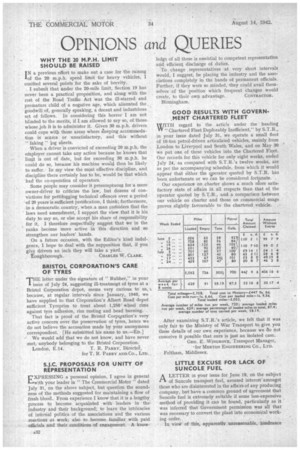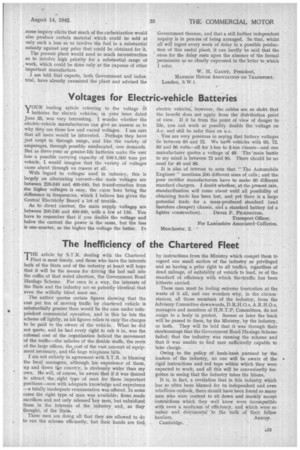OPINIONS and Q UERIES
Page 34

Page 35

If you've noticed an error in this article please click here to report it so we can fix it.
WHY THE 20 M.P.H. LIMIT SHOULD BE RAISED
I N a previous effort to make out a case for the raising of the 20 m.p.h. speed litnif .for heavy vehicles. I omitted several points for the sake of brevity.
I submit that under the 20-mile limit, Section 19 has never been a practical proposition, and along with the rest of the Road Traffic Act was the ill-starred and premature child of a negative age, which alienated the. goodwill of, generally speaking, a decent and industrious set of fellows. In considering this horror I am not blinded to the merits, if I am allowed to say so, of those. whose job it is to administer it. Given 30 m.p.h. drivers could cope with those areas where sleeping accommodatio,n is scarce or unsatisfactory, and this without " faking " tog sheets.
When a driver is convicted of exceeding 20 m.p.h. the employer cannot take any action because he knows that limit is out of date, but for exceeding 30 m.p.h. he could do so, because his machine would then be likely to suffer. In my view the most effective discipline, and discipline there certainly has to be, would be that which had the co-operation of operators.
Some people may consider it presumptuous for a mere owner-driver to criticize the law, but dozens of convictions for pettifogging technical offences over a period of 20 years is sufficient justification, I think; furthermore, in a democratic country, when a man corisiders that the laws need amendment, I support the view that it is his duty to say so, or else accept his share of responsibility for it. I therefore respectfully suggest that we in the ranks become more active in this direction and so strengthen our leaders' hands.
On a future occasion, with the Editor's kind indulgence, I hope to deal with the supposition that, if you give drivers an inch they will take a yard.
Loughborough. CHARLES W. CLARK.
BRISTOL CORPORATION'S CARE OF TYRES
THE letter under the signature of "Rubber," in your issue of July 24, suggesting ill-treatment of tyres at a Bristol Corporation depot, seems very curious to us, t because, at regular intervals since January,, 1940, we have supplied to. that Corporation's Albert Road depot sufficient Tyreprim to treat about 1,250• wheel rims against tyre adhesion, rim rusting and bead burning.
That fact is proof of the Bristol Corpqration's very active concern over the preservation of tyres, hence we do not believe the accusation made by yOur anonymous correspondent. {He submitted his name to us.—ED.] '2 We would add that we do not know, and have never met, anybody belonging to the Bristol Corporation.
London, E.14. T. R. PARRY, Directoi-, for T. R. PARRY AND.00., LTD.
S.J.C. PROPOSALS FOR UNITY OF REPRESENTATION
EXPRESSING a personal opinion. I agree in general with your leader in "The Cpmmercial Motor" dated July 31, on the above subject, but question the soundness of the methods suggested for maintaining a flow of fresh blood. From experience I know that it is a lengthy process to become acquainted with leaders in theindustry and their background; to learn the intricacies of internal politics of the associations and the various reactions at work; also to become familiar with paid officials and their conditions of engagement. A know
ledge of all these is esse'ntial to competent representation and efficierit discharge of duties.
To change .representatives at very short intervals would, I suggest, be placing the industry and the associations completely in the hands of permanent officials. Further, if they were so minded, they could avail themselves of the position which frequent changes would
create, to their own advantage. CONTRACTOR.
Birmingham. .
GOOD RESULTS WITH GOVERN.MENT CHARTERED FLEET WITH regard to the article under the heading " Chartered Fleet Deplorably Inefficient," by S.T.R., in your issue dated July 31, we operate a small fleet of 10-ton petrol-driven articulated vehicles, mainly from London to Liverpool and South Wales, and on May 30 we put one of these vehicles into the Chartered Fleet. Our records for this vehicle for only eight weeks, ended July 24, as compared with S.T.R.'s twelve weeks, are as per the accompanying schedule, from which it would appear that either the operator quoted by S.T.R. has been unfortunate or we can be considered fortunate. .
Our experience on charter shows a much more satisfactory state of affairs in all respects than that of the operator quoted by S.T.R., and a comparison between our vehicle on charter and those on commercial usage proves slightly favourable to the chartered vehicle.
After examining S.T.R.'s article, we felt that it was only fair to the Ministry of War Transport to give you these details of our own e-xperience, because we Zio not conceive it possible that ours is just an isolated case.
GEO. E. WINGRovn, Transport Manager, -for MERTON ENGINEERING CO., LTD. Feltharn, Middlesex.
LITTLE EXCUSE FOR LACK OF SU NCOLE FUEL A LETTER in your issue for June 19, on the subject 1-1 of Suncole transport fuel, aroused interest' amongst those who are disinterested in the affairs of any producing company, but have a common ground of agreement that Suncole fuel is extremely suitable if some less-expensive method of providing it can be found, particularly as it was inferred that Government permission was all that was necessary to convert the plant into economical working order.
In vievi of this, apparently unreasonable, hindrance , some inquiry elicits that much of the carbonization would also produce certain material which could be sold at only such a loss as to involve the fuel in a substantial subsidy against any price that could be obtained for it. 11le present plant would need so much reconstruction as to involve high priority for a substantial range of _ work, which could be done only at the expense of other important manufacture.
I am told that experts, both Government and industrial, have already examined the plant and advised the Government thereon, and that a still further independent inquiry is in process of being arranged. So that, whilst all will regret every week of delay in a possible production of this useful plant, it can hardly be said that the onus for the delay rests upon the absence of the formal permission as so clearly expressed in the letter to which I refer.
W. H. GAUNT, President,
MANSION HOUSE ASSOCIATION ON TRANSPORT. London, S.W.1.




















































